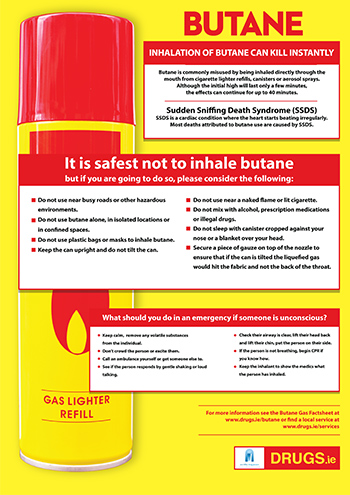Butane gas: Awareness campaign highlights the dangers
 What is Butane Gas?
What is Butane Gas?
Butane is a highly flammable, colourless, odourless gas.
Butane is a hydrocarbon, found in household and industrial products and is potentially intoxicating if deliberately inhaled.
How it’s misused
Butane is commonly misused by being inhaled directly through the mouth either from cigarette lighter refills, canisters or aerosol sprays.
Butane and the body
Butane is a central nervous system depressant which slows down the activity of the brain, affecting physical and mental responses.
When butane is inhaled the fumes are absorbed rapidly through the lungs into the bloodstream.
The chemicals are soluble in body fat and pass rapidly to the brain and organs, so they take effect quickly.
Although the initial high will last only a few minutes, the effects can continue for up to forty minutes. Users may maintain the high by continuing to inhale the fumes.
Short-term effects
It is difficult to calculate the dosage of butane being consumed by users so effects can vary between individuals.
The immediate effects that users describe as desirable are a ‘drunk-like intoxication’ and a ‘euphoria’ or a ‘sense of well-being’.
Immediate side effects that may occur include:
- aggression
- sedation
- possible loss of consciousness
- loss of short term memory
- slurred speech,
- loss of coordination
- confusion
- convulsions & fits
- hallucinations
- blackouts
Long-term effects that may occur include:
- chronic headache
- sinusitis
- ataxia (lack of muscle coordination)
- dizziness
- shortness of breath
- nosebleeds
- chronic or frequent cough
- depression
- anxiety
- tinnitus (noise in ears or head)
Tolerance and dependence
Dependence is usually psychological rather than physical. However physical withdrawal has been reported among some users.
Tolerance to butane can develop quickly meaning that more of the substance is required to get the same effect.
Chronic users may become addicted to butane and experience withdrawal symptoms or a hangover effect if they don’t use regularly.
Withdrawal symptoms can continue for a number of days when use ceases.
Butane withdrawal symptoms
- headache
- anxiety
- nausea
- vomiting
- fatigue
- tremor
- sleep disturbances
- depression
- delirium/ illusions
- mild abdominal pain
- sweating
- muscular cramps
- irritability
- loss of appetite
- slurred speech
Butane: the dangers
Deliberate inhalation of butane can instantly kill and there is no way to avoid this.
Sudden Sniffing Death Syndrome
Sudden Sniffing Death Syndrome (SSDS) is a cardiac condition where the person experiences ‘cardiac arrhythmia’ where the heart starts beating irregularly.
Most deaths attributed to butane use are caused by SSDS. If the person gets excited, startled or participates in any sudden physical activity after inhaling butane, the heart can fail to pump blood.
People who deliberately inhale butane are also at risk of death due to:
- choking on their own vomit
- suffocating
- the back of their throat swelling, putting them at risk of choking
- fatal accidents and explosions if exposed to flames
Butane can also cause long-term health implications such as:
- chemical burns on the skin
- kidney damage
- liver damage
- brain damage
- seizures
- tremors
- visual impairment (may become permanent)
Butane and treatment
Butane users should receive the same support as individuals using stimulants. Motivational Interviewing, Solution-Focused Brief Therapy and Cognitive Behavioural Therapy are effective for this group.
Psychosocial supports should be provided by key workers or counsellors. Butane users generally function well in stimulant support groups.
Harm reduction information
It’s is safest not to inhale butane, but if you are going to use it, please consider the following:
- do not use near busy roads or other hazardous environments
- do not use butane alone, in isolated locations or in closed spaces
- do not use plastic bags of masks to inhale butane
- keep the can upright and do not tilt the can
- do not use near a naked flame or lit cigarette
- do not mix with alcohol, prescription medications or illegal drugs
- do not sleep with a canister cropped against your nose or a blanket over your head
- secure a piece of gauze on top of the nozzle to ensure that if the can is titled the liquefied gas would hit the fabric and not the back of the throat
What should you do in an emergency if someone is unconscious?
- keep calm
- ensure the area immediately around the person is clear of unsafe objects, including volatile substances
- call an ambulance yourself or get someone else to
- check if the person is breathing, and check if they respond to gentle shaking or loud talking
- if the person is breathing, put them in the recovery position and lift their chin to ensure their airway remains clear
- if the person is not breathing, begin CPR if you know how
- don’t crowd the person or excite them
- try to find out what the person has used so you can tell the medics













